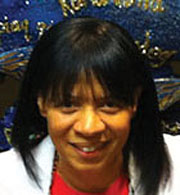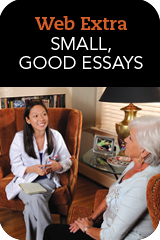Verneeda Spencer, M.D.
By Caperton Gillett
 |
Spencer is helping to create a virtual cancer center to serve patients across Alaska. |
How does a native of Birmingham, Alabama, end up treating cancer patients in Anchorage, Alaska?
“It was my husband’s life’s dream to move here,” says Verneeda Spencer, M.D., a 1981 alumna of the School of Medicine at UAB. “He’s always been very outdoorsy and enjoyed hiking and camping, and he wanted to live in Anchorage.”
While Spencer admits that she “is not as outdoorsy as my husband is,” she has adapted to life in Alaska and even blazed a few trails in the treatment of cancer across the Last Frontier.
Northern Journey
Spencer’s 4,500-mile trip started in the SOM at UAB, where Spencer discovered hematology and oncology. The evolution of the field “is exciting,” she says. “The science behind the treatment steps that are up and coming is phenomenal.” White coat in hand, she moved to Johnson City, Tennessee, for a residency at East Tennessee State University; then she went to Houston, Texas, for three years at M.D. Anderson Cancer Center, where she worked with bone marrow transplant patients and studied the genetics of leukemia.
At that point, she started her trek northward. Spencer followed professor Gary Spitzer, M.D., one of the early pioneers in bone marrow transplantation, to Missouri to help establish the stem cell laboratory at St. Louis University. Her next move took her to West Orange, New Jersey, where she conducted phase I clinical trials with Bristol-Myers Squibb until she and her husband decided to move to Alaska.
“It would have been overwhelming if I had moved straight from Birmingham to Alaska,” Spencer says. “I don’t know if I could have done it if I hadn’t lived in St. Louis and New Jersey.” Sixteen years later, “it looks like it’s working out,” she says.
The biggest adjustment, Spencer explains, wasn’t the weather but the challenge of actually practicing medicine in Alaska. She joined a hematology and oncology practice as its third physician—making her only the fourth person in the office. “We don’t have house staff here, just a single physician assistant,” she says. “There aren’t really fellows or residents. A family practice program will sometimes send medical students up here to spend some time, but for the most part, we do everything ourselves.”
The physicians in her practice work around the issue as best they can, Spencer says. They spend a lot of time at the office, and periodically, doctors from the University of Washington will come up to visit their tumor boards and listen to cases. “They’re fairly helpful if you have a difficult case you want to talk about,” Spencer says. Communication with her colleagues and patients has become crucial in a way she never appreciated before, she adds.
A Virtual Cancer Center
The scarcity of care providers in Alaska is the impetus behind the Alaska Cancer Care Alliance, a new organization that Spencer is helping to develop. The alliance is designed to act as a virtual cancer center, helping patients navigate their cancer care even in the most remote areas of the nation’s largest state. “We’re trying to establish a program that will help patients go through their treatments,” she says. “Even though we’re not a huge cancer center, we want patients to feel like they have everything they need—including emotional and social and even dietary support. In some ways, it’s like a center without walls.”
With the added challenges of practicing oncology in Alaska come unique opportunities and experiences, Spencer notes. That includes watching one of her breast cancer patients compete in the famous Iditarod dogsled race, a 1,150-mile competition that can last up to 17 days in below-zero temperatures. “They spend a lot of time with their dogs, they have trainers, and they really work hard several months of the year getting ready for the Iditarod,” Spencer says. But her patient finished her therapy and “was able to go right out.
“I couldn’t believe she was able to do it, because it’s such a hard race,” she says. “But it’s exciting, I’m sure, for them. I could never do it. There’s no way.”
